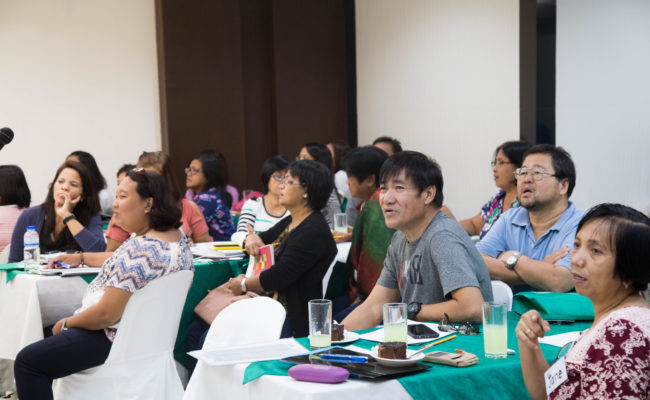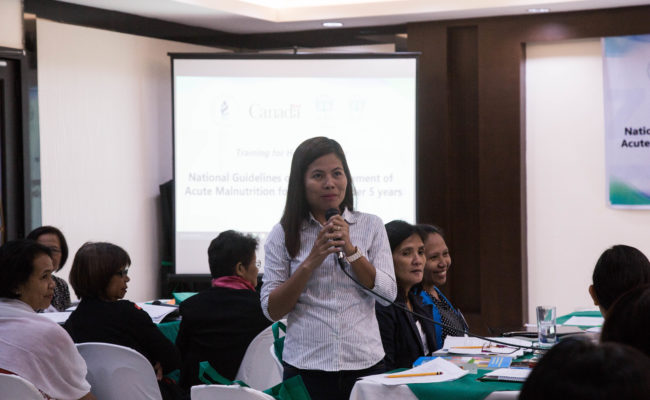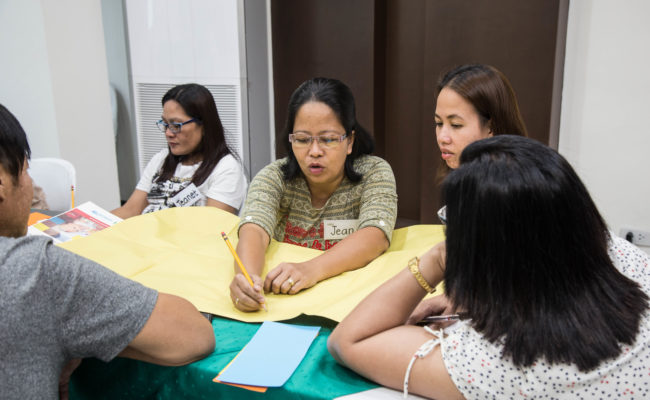Naga City was the spot for medical professionals in mid-January, as the MCH team unveiled their training on severe acute malnutrition (SAM) for health care leaders within the four communities of the EMBRACE project. The training aimed to tackle a serious and heartbreaking issue within health care – preventing the deaths of severely malnourished young children under five across the province.

The room was filled with doctors, midwives, nurses, looking to advance their skills and knowledge surrounding malnutrition, and find ways to institutionalize this information back to their specific communities. Topics presented centered around PIMAM (Philippine Integrated Management of Acute Malnutrition) – and how to apply it back to the communities, the importance of encouraging breastfeeding to mothers, and managing the difficult task of admitting young children into advanced care.

Ira Bisuna, a doctor and health care provider in Presentacion, Camarines Sur, attended the three day training, and spoke with ADRA after the training ended. “For me, as a doctor, my training on this topic is a bit limited, we didn’t even have this type of training in medical school, so this is really useful for us medical professionals.”
“For my municipality alone, we have a lot of cases of severe acute malnutrition, and I really don’t know how to manage them, we just weigh them, and look at them, without any intervention. Presentacion is among the top ten of malnourished municipalities in Camarines Sur.”
Bisuna continued, “one thing that stood out to me was the importance of institutionalizing measures to prevent malnutrition – because we don’t want repeat cases of SAM. We can do the treatment, the critical care, but what is really more important in terms of the public, is the prevention aspect.”
Reflecting on the regional need for greater malnutrition awareness, Dr.Bisuna explained that municipalities like Presentacion have to battle against being far physically from hospitals and medical centers that can provide this care and monitoring.
Throughout the three day training, attendees divided their time between participating in modules on topics such as identifying severe acute malnutrition, inpatient and outpatient care and community mobilization, and working hands on to model care through role playing and interactive activities.
Roger Caceres, MNCH Associate, and one of the organizers of the training, explained that “I feel like this training was not only an accomplishment for us, but for the entire PIMAM team, which started this work years before.”
“I remember a speaker talking about – ‘why now?” and he said ‘we owe an apology to those children in need, especially those who are suffering.’ After doing the training, it really felt like a fulfillment on that, for all the PIMAM advocates who came before.”
“One of the silent emergencies we have here in the Philippines is malnutrition. As we see in the context of the Philippines the malnourished child is being neglected. PIMAM plays a significant role in managing that emergency.”
“Malnutrition is often seen as the silent emergency, as it is happening around us fairly quietly, and can take a while before we realize the level of malnutrition we are dealing with.”

Before the training came to a close the attendees were given a post-test to gauge their grasp on the topics presented, and then awarded a participation certificate.
“I’m very overwhelmed by the support that ADRA has shown – it is very rare. This type of training, we don’t get it very often. I’ve been requesting for this for several years now, but we’ve only been able to actually get it this year,” Dr Bisuna concluded.

